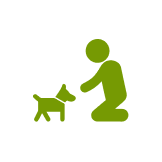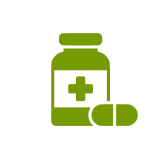In 24 cities
From Recovery to Wellness: Helping Your Dog Heal and Thrive
|
|
Time to read 1 min
Get product availability and delivery timelines based on your location.
No saved addresses found
Add an address to see it hereAre you sure you want to delete this address?
100% Authentic

Easy return policy

Help us ensure a smooth delivery
SIZE GUIDE
Written by: Neel
|
|
Time to read 1 min
Recovering from an illness or surgery can be a challenging time for your dog. As a pet parent, it's important to provide the right care and support to help your dog return to full health and become holistically well. Here's how you can guide your dog on the journey from recovery to wellness:
1. Nutrition: The Foundation of Healing
A balanced diet is crucial during your dog's recovery. Opt for high-quality, easily digestible food that promotes healing. Adding supplements like omega-3 fatty acids can help reduce inflammation, while protein supports tissue repair. If your dog is recovering from surgery, consider offering smaller, more frequent meals to help digestion.
After the recovery phase, consider transitioning to a holistic diet that supports long-term health. Include a variety of nutrient-rich foods like lean meats, vegetables, and healthy fats, and consider adding superfoods like turmeric and ginger, known for their anti-inflammatory properties.
2. Gentle Exercise and Rehabilitation
Rest is important during the early stages of recovery, but as your dog heals, gentle exercise becomes vital. Short walks, light play, and physical therapy can help regain muscle strength and mobility. Always consult your vet for a suitable exercise plan that suits your dog's condition and breed.
Incorporating activities like swimming can be an excellent low-impact option to build strength without putting too much strain on joints.
3. Mental and Emotional Support
Physical recovery is only part of the healing journey. Mental health is just as important. A dog recovering from illness may feel anxious, confused, or depressed. Maintaining a calm, supportive environment can help reduce stress.
Interactive toys, puzzle feeders, and training sessions can stimulate your dog’s mind, keeping them engaged and providing a sense of normalcy. Make sure to shower them with love and attention, reinforcing positive behaviors.
4. Regular Vet Check-ups and Preventative Care
After the recovery phase, schedule regular check-ups to ensure your dog’s health is progressing. Preventative care, such as vaccinations, flea and tick treatments, and regular grooming, plays a significant role in keeping your dog in optimal health.
By following a holistic approach to recovery, your dog will not only heal faster but will also lead a healthier, happier life.



In 24 cities

Happy pet parents

For every new member

Exclusive
2 item in cart
₹10,360


